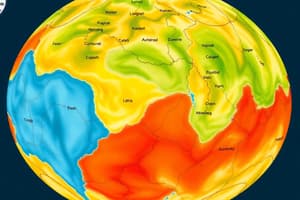Podcast
Questions and Answers
What is the capital of France?
What is the capital of France?
- Berlin
- Lisbon
- Paris (correct)
- Madrid
The Earth is the third planet from the Sun.
The Earth is the third planet from the Sun.
True (A)
What chemical element has the symbol 'O'?
What chemical element has the symbol 'O'?
Oxygen
Water expands when it freezes, which is why ice ______.
Water expands when it freezes, which is why ice ______.
Match the following scientists with their contributions:
Match the following scientists with their contributions:
Which of the following is a property of water?
Which of the following is a property of water?
All liquids have the same density as water.
All liquids have the same density as water.
What is the term for the process by which plants release water vapor into the atmosphere?
What is the term for the process by which plants release water vapor into the atmosphere?
The chemical formula of water is ______.
The chemical formula of water is ______.
Match the following scientists with their contributions to the understanding of water:
Match the following scientists with their contributions to the understanding of water:
Flashcards are hidden until you start studying
Study Notes
Module Summaries
-
Module 1: Chemical Reactions: Analysis of matter transformations through chemical reactions, representations, types, and their relation to matter conservation laws. Includes topics like chemical change as a reaction, parts of a chemical reaction, classification of reactions by energy, and different reaction types (synthesis, decomposition, single and double substitution).
-
Module 2: Oxidation-Reduction Processes: Examines the process of oxidation-reduction, including the concepts of oxidation number, electron gain and loss, and examples of redox reactions in everyday situations.
-
Module 3: Balancing Chemical Equations: Explores methods for balancing chemical equations, emphasizing the principles of conservation of mass and the importance of balancing for accuracy. Different approaches such as the "trial-and-error" or "inspection" method.
-
Module 4: Mixtures: Study of homogenous and heterogeneous mixtures, separation techniques based on component properties, and characteristics of solutions (colloids, suspensions).
-
Additional Topics: Includes discussion of acids, bases, pH, neutralization reactions, and their significance within chemical processes and daily life. Also covers the concept of the mole and Avogadro's number, including their applications in calculations. Solutions and their percentage concentration. More advanced calculations.
Studying That Suits You
Use AI to generate personalized quizzes and flashcards to suit your learning preferences.




